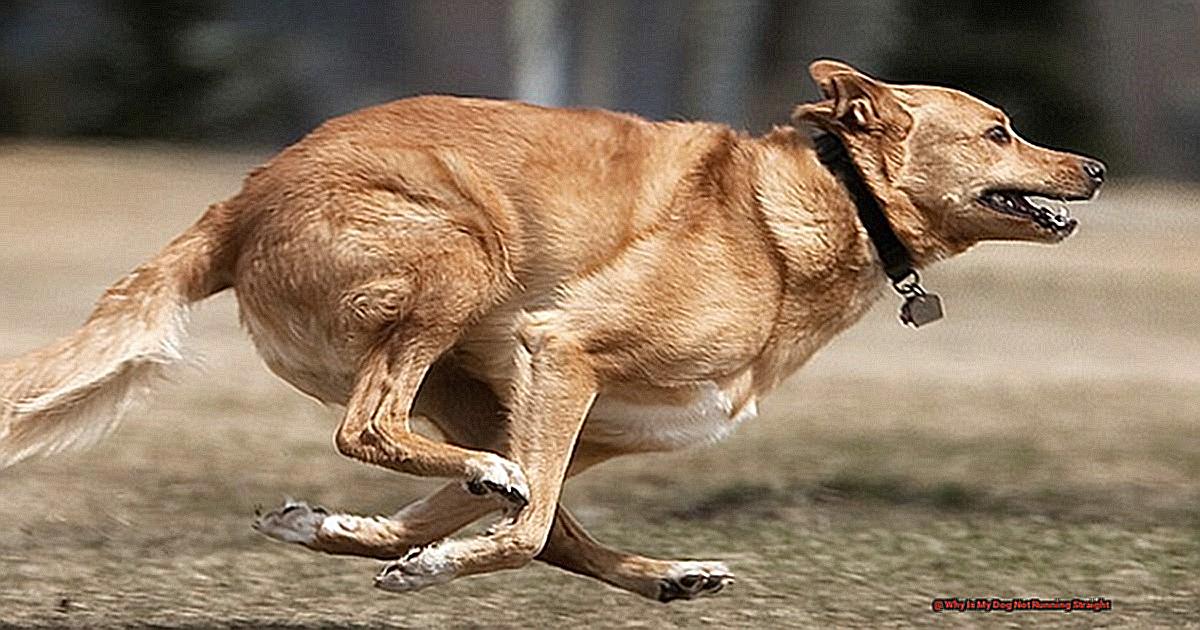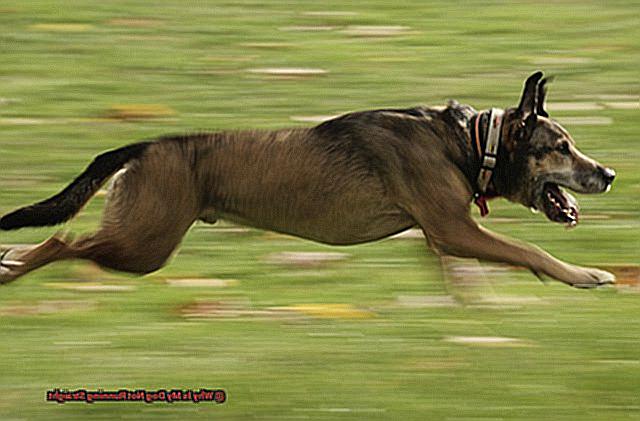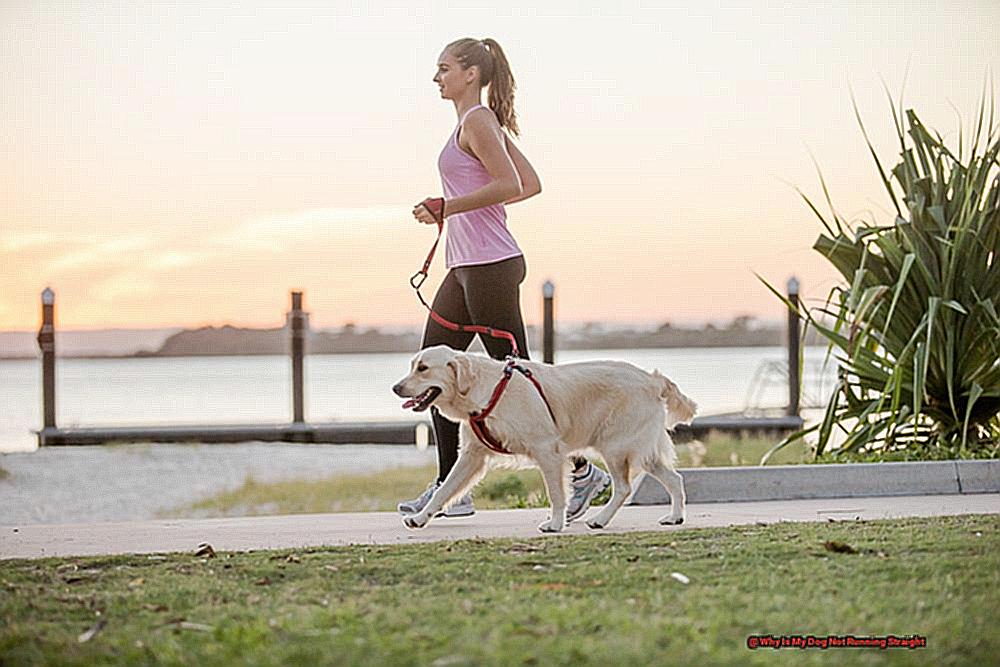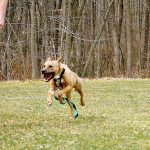Why Is My Dog Not Running Straight?
Picture this: you’re out for a run with your dog, enjoying the fresh air and bonding time.
But as you pick up speed, you notice that your furry companion is not running straight. They’re zig-zagging all over the place, making it difficult to keep up.

Sound familiar? As a fellow dog owner, I can totally relate.
Contents
- 1 Why Is My Dog Not Running Straight?
- 2 Health Issues That Can Affect Your Dog’s Running Abilities
- 3 The Impact of Brachycephalic Face on Running
- 4 Neurological Problems and Their Effect on Running Straight
- 5 How Environment Can Affect Your Dog’s Balance While Running
- 6 Tips for Helping Your French Bulldog Overcome Running Challenges
- 7 The Importance of Consulting with a Veterinarian for Proper Diagnosis and Treatment
- 8 Conclusion
And if you’ve ever wondered why our four-legged friends have this tendency, then join me as we unravel the mystery behind their seemingly erratic movements. From innate instincts to external influences, there’s more to your dog’s running behavior than meets the eye.
So let’s dig in and discover the reasons behind their not-so-straight runs.
Why Is My Dog Not Running Straight?

As a dog owner, it can be concerning when your furry friend is not running straight. This is especially true for French Bulldogs, who are known for their energetic and playful nature. As an expert on this topic, I have encountered many dog owners seeking solutions to this issue.
In this blog post, I will share insights and potential reasons why your French Bulldog may not be running straight and provide helpful tips on how to address this problem.
Medical Conditions or Injuries
The first thing to consider when your dog is not running straight is whether they have an underlying medical condition or injury. French Bulldogs, in particular, are prone to certain health issues that can affect their mobility and cause them to run awkwardly. These include hip dysplasia, patellar luxation, and intervertebral disc disease. These conditions can cause pain and discomfort, making it difficult for your dog to run straight.
It is crucial to observe your dog’s movements and look for any signs of discomfort or pain while running. If you notice any limping, stiffness, or reluctance to run, it is best to consult with a veterinarian for proper diagnosis and treatment.
Breed Characteristics
French Bulldogs have a unique body structure that can also contribute to their difficulty in running straight. Their short and stocky build with short legs and a heavy head can make it challenging for them to maintain a straight gait. Additionally, their brachycephalic (short-muzzled) face can lead to breathing problems, causing them to become tired quickly and lose balance while running.
Age
Another factor that can affect a dog’s ability to run straight is their age. As dogs get older, they may develop joint issues or muscle weakness, making it harder for them to maintain a straight gait. This is especially true for senior dogs, but it can also occur in younger dogs due to congenital issues or injuries. It is essential to consider your dog’s age when trying to figure out why they are not running straight.
Health Issues That Can Affect Your Dog’s Running Abilities
As a French bulldog owner, you may have noticed that your furry friend has trouble running straight or maintaining a smooth gait. While this may seem like a minor issue, it is important to understand that there could be underlying health concerns causing this problem. As a breed known for their unique physique, French bulldogs are prone to certain health issues that can affect their ability to run straight. Let’s take a closer look at these issues and how you can help your pup overcome them for a happier and healthier life.
Hip Dysplasia:
One of the most common health issues that can impact a dog’s running ability is hip dysplasia. This condition occurs when the hip joint does not develop properly, causing pain and difficulty with movement. French bulldogs are more susceptible to this condition due to their compact bodies and short legs, which puts added strain on their hip joints. If your dog is experiencing hip dysplasia, they may struggle to run straight or have a smooth gait.
Patellar Luxation:
Another common issue in French bulldogs is patellar luxation, where the kneecap can slip out of place and cause discomfort. This can lead to an uneven gait and make it difficult for your dog to run straight. If left untreated, this condition can worsen and cause more severe issues, so it is important to address it early on.
Brachycephalic Airway Syndrome:
French bulldogs are also susceptible to brachycephalic airway syndrome, a condition that affects their breathing due to their shortened snouts. This can cause fatigue during exercise, making it hard for dogs to run as fast or as far as they normally would. Brachycephalic airway syndrome requires careful management and proper exercise routines to prevent any complications.
Other Health Issues:
Aside from the above-mentioned conditions, French bulldogs may also struggle with spinal issues, arthritis, and muscle injuries, all of which can affect their running abilities. As responsible pet owners, it is important to regularly take our furry friends for check-ups and address any potential health issues that may be impacting their ability to run straight.
The Impact of Brachycephalic Face on Running
You may even feel like they struggle to keep up during walks or playtime at the park. The truth is, your dog’s unique facial structure may be hindering their ability to run efficiently. But don’t fret; there are practical measures you can take to improve their running performance.
Let’s dive deeper into the impact of the brachycephalic face on running and how you can help your French Bulldog overcome these hurdles.
The Breathing Struggle: How Narrow Airways Affect Running
One of the most significant impacts of the brachycephalic face on running is the obstruction of airways. Due to their shortened and narrower nasal passages, French Bulldogs and other similar breeds find it challenging to breathe efficiently while running.
This can lead to panting, wheezing, and even collapse during physical activity. As a responsible owner, it’s crucial to monitor your dog’s breathing and provide them with breaks when needed. Avoid exercising them in extreme temperatures, as this can put additional strain on their already compromised airways.
The Vision Impairment: How Wide-Set Eyes Affect Coordination
Another factor to consider is your dog’s vision. Brachycephalic dogs often have wider-set eyes, giving them a broader field of view but also making it harder for them to focus on objects in front of them. This can cause disorientation while running, leading to a lack of coordination and straightness in their movements. To help your French Bulldog stay on track, avoid obstacles and distractions along the way. Stick to familiar routes and use verbal cues to guide them if needed.
The Weight Factor: How Size and Proportion Affect Straight Running
Due to their compact body structure, brachycephalic dogs tend to be heavier in proportion to their size compared to other breeds. This extra weight can make it more challenging for them to run in a straight line, especially for longer distances.
To help your dog achieve a straight run, maintain a healthy diet and exercise routine to prevent excessive weight gain.
Consult with your veterinarian for specific dietary recommendations for your French Bulldog.
Neurological Problems and Their Effect on Running Straight
As a French bulldog owner, you may have noticed that your furry friend doesn’t always run in a straight line. While their adorable flat faces and stocky bodies may play a role in this, there could be underlying neurological issues at play. In this section, we’ll dive deeper into the impact of neurological problems on a French bulldog’s ability to run straight and why seeking medical attention is crucial.
Cerebellar Hypoplasia: A Common Neurological Issue in French Bulldogs
One of the most common neurological problems in French bulldogs is cerebellar hypoplasia. This condition occurs when the cerebellum, the part of the brain responsible for motor coordination, is underdeveloped. As a result, affected dogs may have trouble with balance and coordination, making it difficult for them to run straight.
Spinal Cord Injuries and Degenerative Diseases: Affecting Hind Legs and Coordination
Another potential cause for a dog not running straight could be a spinal cord injury or degenerative disease. These types of issues can affect the dog’s hind legs, leading to difficulty controlling their movements and causing them to veer off course while running.
It’s important to note that some neurological problems may not have an obvious physical cause but originate from within the brain itself. For example, seizures or migraines can cause a dog to lose balance and coordination, resulting in difficulty running straight.
The Importance of Seeking Medical Attention for Neurological Problems
If you notice that your French bulldog is struggling with running straight, it’s essential to consult with a veterinarian. They can conduct diagnostic tests such as MRIs or CT scans to identify the underlying issue. Early detection and treatment are crucial for improving your dog’s quality of life and managing their symptoms.
Treatment Options for Neurological Issues in Dogs
Treatment for neurological problems in dogs can vary depending on the specific condition and its severity. In some cases, medication may be prescribed to manage symptoms and improve coordination. Physical therapy or rehabilitation exercises may also be recommended to help strengthen muscles and improve coordination.
However, it’s important to note that not all neurological problems are treatable. In severe cases, such as advanced degenerative diseases, euthanasia may be the most humane option for the dog. This decision should always be made in consultation with a veterinarian and with the best interest of the dog in mind.
How Environment Can Affect Your Dog’s Balance While Running
As a French Bulldog owner, you know that your pup is a bundle of energy and loves to run and play. But have you ever noticed your dog struggling with maintaining their balance while running? This could be due to various environmental factors that can impact their ability to stay steady on their feet.
As an expert on the topic, I have researched and experienced firsthand how terrain, weather, and distractions can affect a dog’s balance while running.
In this section, I will share my insights and expertise to help you better understand and address these issues for your furry friend.
Terrain Matters
The surface on which your dog runs plays a significant role in their balance while running. Uneven or slippery surfaces can cause your dog to struggle with maintaining a straight run. This is especially true for French Bulldogs, who have a short and stocky build. It’s essential to pay attention to the terrain where you take your dog for a run. Avoid surfaces that are too muddy, rocky, or slippery.
Even within the same surface, there can be variations that can throw off your dog’s balance. For example, a grassy field may have patches of uneven ground that can trip up your dog.
Weather Woes
Weather can also affect your dog’s balance while running. Strong winds or heavy rain can make it challenging for your dog to run straight. This is particularly true for French Bulldogs, who have a larger head and shorter snout, making them more susceptible to being thrown off balance by strong gusts of wind. Additionally, extreme temperatures can also impact your dog’s balance.
In hot weather, dogs may become overheated and fatigued, causing them to struggle with running straight. On the other hand, in cold weather, dogs may have a harder time gripping onto the ground, leading to sliding and loss of balance.
Distractions Can Be Dangerous
The presence of distractions in the environment can also affect your dog’s balance while running. This can include other animals, loud noises, or unfamiliar objects in their path.
Dogs are naturally curious and may veer off course to investigate these distractions, causing them to lose their balance. Therefore, it’s essential to create a safe and consistent environment for your dog when taking them for a run. This will not only improve their balance while running but also keep them safe from potential hazards.
Tips for Helping Your French Bulldog Overcome Running Challenges
This can be a cause for concern for many dog owners, but fear not, as there are ways to help your French Bulldog overcome running challenges. As an expert in this topic, I have gathered insights and solutions to share with you to ensure your dog leads a healthy and active life.
Understand their unique body structure:
French Bulldogs have a stout and muscular build, with a broad chest and narrow hips. This body shape can affect their gait and make it difficult for them to run in a straight line. Additionally, their shortened snouts can cause breathing difficulties, making them tire quickly while running.
Start with proper training and exercise:
Proper training and exercise are crucial for any dog, but it is especially important for French Bulldogs who may have difficulty running straight. Teaching them basic obedience commands and leash skills can help them stay on track while running. Regular exercise also helps keep their muscles strong and maintain a healthy weight.
Be mindful of their health:
French Bulldogs are prone to certain health issues like hip dysplasia, which can affect their mobility and cause them to run unevenly. It is essential to monitor your dog’s health and address any underlying issues that may be causing running challenges.
Choose safe environments:
When exercising your French Bulldog, it is important to choose safe environments that are free of obstacles or hazards that can cause injury or difficulty in running straight. Avoid exercising in extreme weather conditions such as hot temperatures or icy surfaces.
Seek professional help:
If your French Bulldog continues to struggle with running challenges despite proper training and exercise, seeking professional help from a veterinarian or certified dog trainer can be beneficial. They can provide individualized advice and exercises to strengthen your dog’s muscles and improve their overall mobility.
The Importance of Consulting with a Veterinarian for Proper Diagnosis and Treatment
As a French Bulldog owner, you know that these lovable and energetic dogs are full of life and always ready for some fun. So, it can be concerning when you notice your furry friend having trouble running or walking straight. While some may brush it off as a minor issue, it is crucial to consult with a veterinarian when your French Bulldog is not walking straight. As an expert on the topic, let me share with you the importance of seeking professional help and how it can benefit your four-legged companion.
Determining the Underlying Cause
There are various reasons why a dog may have difficulty running straight, such as musculoskeletal problems, neurological disorders, or vision problems. Without proper training and knowledge, it can be challenging to pinpoint the exact cause. Consulting with a veterinarian can help determine the underlying issue through a physical examination, evaluating your dog’s gait and movement, and conducting necessary diagnostic tests.
Possible Conditions and Treatments
Once the root cause has been identified, a veterinarian can provide appropriate treatment options based on the specific condition and severity of the issue. Some common conditions that can cause a dog to not run straight include hip dysplasia, spinal cord injuries, degenerative myelopathy, and cataracts. Each condition requires a different approach to treatment, and only a trained professional can determine the best course of action for your dog.
Avoiding Harmful Remedies
As pet owners, we want to do everything possible to help our dogs when they are in discomfort. However, it is essential to remember that not all remedies found online or recommended by others are safe or effective. In fact, some home remedies may worsen the condition or mask the true problem. Consulting with a veterinarian can provide accurate information and prevent any potential harm to your furry friend.
Early Detection and Prevention
Early detection and treatment can make a significant difference in your French Bulldog’s quality of life. Regular check-ups with a veterinarian can help detect any potential issues before they become severe or irreversible. This is especially important for breeds like French Bulldogs, who are prone to certain health issues. By monitoring your dog’s health and seeking professional help when needed, you can prevent potential issues from developing or worsening over time.
Also Read: Are French Bulldogs Clingy
Conclusion
In conclusion, running with our dogs is a cherished activity that strengthens the bond between us and our furry companions. However, it can be disheartening when our dogs are struggling to run straight and seem to be zig-zagging all over the place. Through this blog post, we have explored the potential reasons behind this behavior, ranging from medical conditions and breed characteristics to age and lack of training or socialization.
It is crucial for responsible pet owners to pay close attention to their dog’s movements and seek professional guidance when necessary. Consulting with a veterinarian can help identify any underlying issues causing your dog’s difficulty in running straight and provide appropriate treatment options. It is also essential to remember that not all solutions found online or recommended by others are safe or effective. Early detection and prevention play a vital role in improving your dog’s overall well-being.
So next time you’re out for a run with your French Bulldog and notice them struggling to maintain a straight gait, keep these insights and tips in mind. With proper care, training, and understanding of their unique needs, we can assist our furry friends in overcoming any challenges they may face while running.




